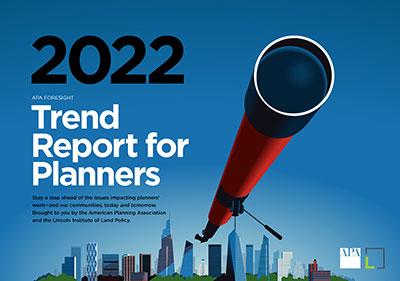APA Foresight Communities
What is a Foresight Community?
A Foresight Community is a multidisciplinary group of select experts who meet regularly through facilitated workshops. The community members are thought leaders in their fields and are chosen based on their ability to provide forward-thinking perspectives. APA currently convenes two types of Foresight Communities: "deep dive" communities on specific foresight topics and a trend scouting community dedicated to trend scouting and horizon scanning.
Trend Scouting Foresight Community
For a successful foresight practice, diversity is key to capturing different perspectives, ensuring that we identify a variety of trends directly or indirectly connected to planning, and avoiding missing trends or signals within or outside the planning world.
The purpose of the Trend Scouting FSC is to seek input from community members on potential drivers of change, shifts, and disruptors around us, and emerging trends and potential future trends relevant to planning. The community includes thought leaders from multiple disciplines, industries, backgrounds, career stages, and countries. In addition to planners from different planning fields, we work with engineers, architects, anthropologists, computer scientists, psychologists, sociologists, and public health professionals, among others. Our group includes practitioners, academics, and students.
With our Trend Scouting Foresight Community, we want to imagine futures beyond the views and perspectives within the planning profession, challenging the continuation of our past and present.
The members of the Trend Scouting Foresight Community meet quarterly to share observations, discuss occurring shifts they have observed, and hint at signals that could evolve into future trends.
This FSC is conducted in partnership with the Lincoln Institute of Land Policy. As part of this partnership, APA publishes an annual trend report, providing a list of emerging trends and guidance on how to navigate them. The report aims to help planners prepare for an uncertain future. The observations from the Trend Scouting Foresight Community provide an important input to this report.
For a list of our trend scouts, see the respective trend report:
2024 Trend Report for Planners
APA Foresight
The 2024 Trend Report for Planners, developed in partnership with the Lincoln Institute of Land Policy, features more than 100 existing, emerging, and potential future trends that APA identified as relevant to planning. The trends are structured within three timeframes (Act Now, Prepare, Learn, and Watch), which indicate the urgency of planners' actions.
2023 Trend Report for Planners
APA Foresight
The 2023 Trend Report for Planners, developed in partnership with the Lincoln Institute of Land Policy, features more than 100 existing, emerging, and potential future trends that APA identified as relevant to planning. The trends are structured within three timeframes (Act Now, Prepare, Learn, and Watch), which indicate the urgency of planners' actions.
2022 Trend Report for Planners

APA Foresight
The 2022 Trend Report for Planners features nearly 100 existing, emerging, and potential future trends that APA identified as relevant to planning. The trends are structured within three timeframes which indicate the urgency of planners' action.
Artificial Intelligence in Planning Foresight Community
Artificial intelligence is expected to be one of the biggest disruptors of the 21st century, with impacts affecting the economy, the built environment, society, and most professions, including the planning profession. If deployed right and responsibly, AI has the potential to assist planners in their work and improve existing planning processes. However, it also bears the risk of exacerbating existing inequalities in society. The primary purpose of the Foresight Community on "AI in Planning" is to understand the potential role AI may play in the planning profession and the work that planners do, with a deliberate focus on equity and the need for equitable deployment.
AI in Planning: Opportunities and Challenges and How to Prepare

APA Foresight
This white paper summarizes the findings from APA's "AI in Planning" Foresight Community and suggests initial ideas on how planners can prepare for AI and its potential impacts, how planners can ensure AI-based planning tools are used in equitable and inclusive ways, and what the role of the planner should be in developing and using AI-based planning tools.


